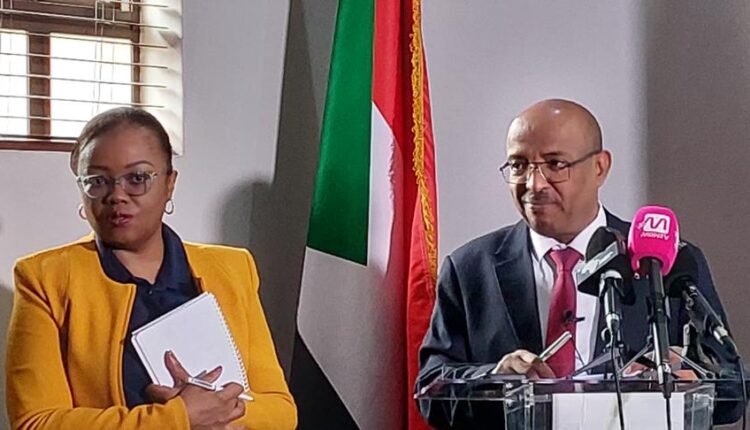Sudanese Embassy in South Africa Urges International Action Against UAE Support for RSF Militia Crimes in Sudan

Sudanhorizon, Pretoria – 7 November 2025
The Embassy of the Republic of the Sudan in South Africa has called on the international community to impose sanctions and an immediate arms embargo on the United Arab Emirates (UAE) for its alleged support of the paramilitary forces accused of committing atrocities and acts of genocide in Sudan.
Speaking at a press conference held at the National Press Club in Pretoria on Friday, Ambassador Osman Abu Fatima Adam condemned what he described as “a war imposed on Sudan and its people by a notorious terrorist militia formerly known as the Janjaweed.” The event, attended by numerous international and local media outlets, featured video evidence and photographs documenting large-scale violations by the militia in the city of El Fasher.
Media Complicity and Foreign Interference
The Ambassador accused the UAE of “funding and manipulating global narratives” to whitewash the image of the rebel militia, which he said had led to widespread misinformation about the conflict. “The world has remained captive to distorted media narratives created and financed by the militia and its regional sponsor,” he said, adding that this “media complicity” had created a culture of impunity, allowing the militia to commit further crimes across Sudan.
He stated that the ongoing conflict was the result of deliberate planning and recruitment by the militia along ethnic lines, long before hostilities began. The group, he noted, had refused to comply with the Security Arrangements Agreement, which required the integration of all armed factions into the national army — a refusal that he said revealed “premeditated intent to destabilise the state.”
Siege and Atrocities in El Fasher
Ambassador Abu Fatima described the humanitarian situation in El Fasher as catastrophic, citing a two-year siege during which the militia launched 267 attacks using all types of weapons, including internationally banned ones such as toxic gases and white phosphorus. He alleged that the militia’s recent advance into the city on 25 October was made possible by covert support from the UAE through Kufra Airport in Libya, Bosaso Airport in Somalia, and Nyala Airport in western Sudan.
Presenting verified images and footage, the Ambassador labelled the massacres in El Fasher as “acts of genocide against unarmed civilians,” accusing the international community of inaction despite clear evidence of atrocities. He also criticised the militia’s disregard for UN Security Council Resolution 2736, which demanded the lifting of the siege and the unimpeded delivery of humanitarian aid.
Gender-Based Violence as a War Strategy
Highlighting the brutality of the conflict, Ambassador Abu Fatima said that women and girls had been deliberately targeted. He stressed that rape was used as a weapon of war to pursue demographic change against indigenous African communities in Darfur. “This was not incidental violence — it was a deliberate, systematic strategy combining hunger, disease, displacement, and ethnically motivated attacks,” he stated.
Calls for Sanctions and Accountability
The Ambassador accused the UAE of using its wealth to “buy the silence of the world,” adding that its influence had emboldened it to evade accountability for its actions. He revealed that the UAE had previously applied a similar approach in Libya and was now encouraging the Sudanese militia to establish a parallel government in Nyala, a move he said had been rejected by both the international community and the African Union Peace and Security Council.
Ambassador Abu Fatima urged the international community to take decisive action, calling for an immediate arms embargo on the UAE, the imposition of sanctions on the rebel militia, and its designation as a terrorist entity. He also called for the prosecution of the militia’s leaders for war crimes and atrocities committed against the Sudanese people.
He further appealed to the African Union to hold the UAE accountable for arming the militia, to condemn the complicity of African states that facilitated arms transfers, and to classify both the militia and its sponsors as terrorist organisations and state supporters of terrorism.
Appeal to South Africa and the Global Community
In closing, Ambassador Abu Fatima expressed gratitude to South Africa and President Cyril Ramaphosa for their principled support for peace. He called on South Africa to back Sudan’s efforts to seek justice through international legal mechanisms and to reject any parallel government structures established by the militia.
He also invited South Africa to assist in reconstruction, institutional reform, and humanitarian relief, with a special focus on supporting Sudanese women during what he described as a “critical juncture in Sudan’s history.”
Finally, the Ambassador urged South African authorities to facilitate visa and residence permits for Sudanese families stranded in the country until conditions in Sudan stabilise.
Shortlink: https://sudanhorizon.com/?p=8546

